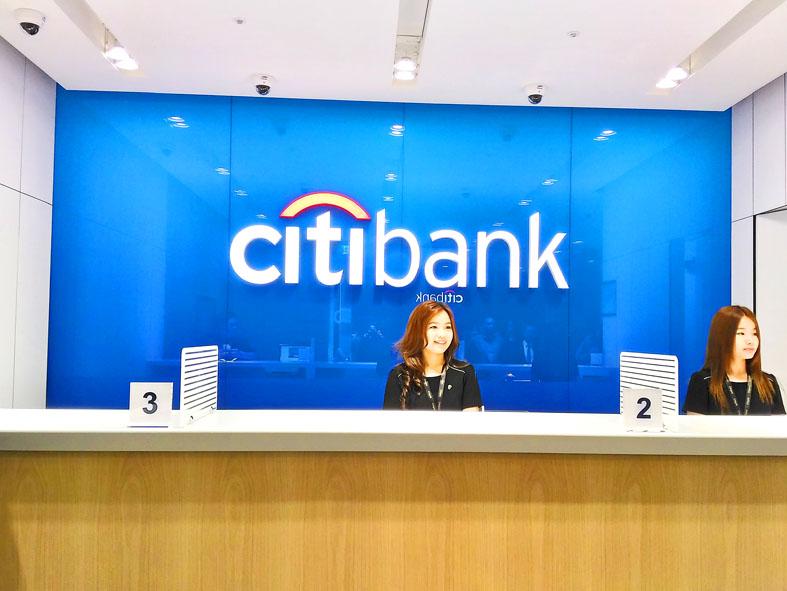Citibank Taiwan Ltd (花旗台灣) yesterday said that credit card clients could continue using their cards as operations would continue normally until it sells its consumer banking business.
As of February, the bank had 2.86 million credit cards in circulation in Taiwan, of which 2.17 million had been used in the past six months, ranking it sixth among all banks, data from the Financial Supervisory Commission showed.
Credit card spending by Citibank clients totaled NT$15.66 billion (US$552.6 million) in February, also ranking sixth among banks in Taiwan. Citibank was the only foreign bank that made it into the top six.

Photo: Lee Chin-hui, Taipei Times
Customers should not be concerned about using their Citi cards, as the bank would be operating normally until it finds a buyer for its consumer banking business, with no timeline set at the moment, the bank said.
Those who have taken personal loans, mortgages or other types of loans from Citibank should continue paying their debt, it said.
The announcement on Thursday by Citigroup Inc, the bank’s parent company, that it would exit the retail banking business in 13 markets — including Taiwan — has raised concern among Taiwanese consumers, with many wondering whether their rights would be protected.
Some Citi credit card holders told the Taipei Times that they were not clear if there is a deadline for redeeming their cash rewards or how long other types of rewards, such as a 40 percent discount on movie tickets, would last.
The Financial Supervisory Commission, which on Thursday confirmed that Citibank Taiwan is seeking a buyer for its consumer banking business, yesterday said it would ask the buyer to ensure that consumers’ rights are protected.
Citibank Taiwan held a videoconference yesterday morning to try to reassure its employees, saying that its decision would not affect them “immediately.”
However, some staff members, speaking on the condition of anonymity, told the Taipei Times that they felt confused and unprepared.
The bank had just in December last year revamped its three credit cards by offering better rewards and improved its digital banking app to attract new customers, they said.
That did not suggest that it would be closing its consumer banking business in less than five months, they said.
Citibank Taiwan actually planned to expand its local investment and recruit more talent at the beginning of this year, people familiar with the matter said.
Meanwhile, DBS Bank Taiwan (星展銀行) yesterday said that it would not comment on market speculation that it would acquire Citibank Taiwan’s consumer banking operation.
Citibank Taiwan reported a pretax profit of US$338 million for last year, ranking first among all foreign banks in the nation, company data showed.
Its return on assets and return on equity stood at 1.14 percent and 9.18 percent respectively last year, higher than the market averages, the data showed.

Three experts in the high technology industry have said that US President Donald Trump’s pledge to impose higher tariffs on Taiwanese semiconductors is part of an effort to force Taiwan Semiconductor Manufacturing Co (TSMC, 台積電) to the negotiating table. In a speech to Republicans on Jan. 27, Trump said he intends to impose tariffs on Taiwan to bring chip production to the US. “The incentive is going to be they’re not going to want to pay a 25, 50 or even a 100 percent tax,” he said. Darson Chiu (邱達生), an economics professor at Taichung-based Tunghai University and director-general of

Hon Hai Precision Industry Co (鴻海精密) is reportedly making another pass at Nissan Motor Co, as the Japanese automaker's tie-up with Honda Motor Co falls apart. Nissan shares rose as much as 6 percent after Taiwan’s Central News Agency reported that Hon Hai chairman Young Liu (劉揚偉) instructed former Nissan executive Jun Seki to connect with French carmaker Renault SA, which holds about 36 percent of Nissan’s stock. Hon Hai, the Taiwanese iPhone-maker also known as Foxconn Technology Group (富士康科技集團), was exploring an investment or buyout of Nissan last year, but backed off in December after the Japanese carmaker penned a deal

WASHINGTON POLICY: Tariffs of 10 percent or more and other new costs are tipped to hit shipments of small parcels, cutting export growth by 1.3 percentage points The decision by US President Donald Trump to ban Chinese companies from using a US tariff loophole would hit tens of billions of dollars of trade and reduce China’s economic growth this year, according to new estimates by economists at Nomura Holdings Inc. According to Nomura’s estimates, last year companies such as Shein (希音) and PDD Holdings Inc’s (拼多多控股) Temu shipped US$46 billion of small parcels to the US to take advantage of the rule that allows items with a declared value under US$800 to enter the US tariff-free. Tariffs of 10 percent or more and other new costs would slash such

SENSOR BUSINESS: The Taiwanese company said that a public tender offer would begin on May 7 through its wholly owned subsidiary Yageo Electronics Japan Yageo Corp (國巨), one of the world’s top three suppliers of passive components, yesterday said it is to launch a tender offer to fully acquire Japan’s Shibaura Electronics Co for up to ¥65.57 billion (US$429.37 million), with an aim to expand its sensor business. The tender offer would be a crucial step for the company to expand its sensor business, Yageo said. Shibaura Electronics is the world’s largest supplier of thermistors, with a market share of 13 percent, research conducted in 2022 by the Japanese firm showed. If a deal goes ahead, it would be the second acquisition of a sensor business since